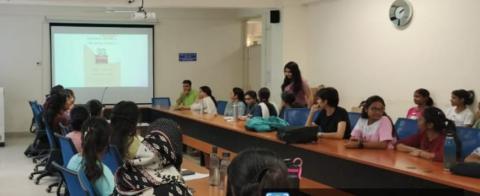
Insights from Engaging with B.EL.ED Students at IHE
A couple of weeks ago, I had the opportunity to interact with the students of B.EL.ED at IHE, University of Delhi. Often in school, when you find a teacher with perspective, opinion, and assertiveness, you ask, "Are you a B.EL.ED graduate?". Most often, the answer is "Yes!" The next question follows: "Which college?" It’s one of the eight colleges of Delhi University that offer this program. There is no doubt that graduates from these colleges often outshine their colleagues. This also raises questions about the dilapidated state of teacher education in many parts of the country.
The majority of teachers who have technically bought a B.Ed degree from the many B.Ed colleges mushrooming across the country lack professional training to teach; they merely fulfill technical eligibility criteria. Interestingly, the new education policy has identified this peculiar problem in teacher education and has recommended major reforms, including closing down standalone B.Ed colleges and integrating them into universities. It also recommends mandatory four-year integrated B.Ed programs, which only a few institutions have been offering so far.
When I shared my experience about how B.EL.ED graduates are easily identified, a senior faculty member confided that the situation has changed. This will no longer be the case. Delhi University, which previously had the privilege of designing entrance exams and interviews for B.EL.ED admissions, has seen this process taken away. The CUET has liberalized this course, allowing students from various backgrounds to enter the program. Aptitude doesn’t matter as much anymore; opportunity does. So, if a student isn’t shortlisted for a regular B.A program at a leading college but has the option to enter via the B.EL.ED program, they choose it. Thus, it has become a matter of convenience rather than aptitude.
For the last three decades, the program has produced some outstanding teachers, scholars, and researchers in education. I have had numerous opportunities to work with many of them on various occasions. It’s always enriching to interact with students of the B.EL.ED program, whether on campus or in the field. Here, I had the opportunity to speak about my research on children’s writing and social science pedagogy. Teachers at most places find it relatable, regardless of where they teach. Making learners write, whether they are children or adults, is always a difficult task. I shared insights from my prolonged field experience and believe that this work is relevant at any level. I argue that the challenges in writing arise because we do not train our students to write; instead, we mistakenly train them to copy. They copy from other students' notebooks, prescribed books, or the blackboard. An advanced form of copying is memorizing given text and regurgitating it when asked, and now, copying from AI-generated text. To promote writing, we must first stop copying.
In an hour-long conversation, I enjoyed the questions from both students and faculty members and, of course, the warm hospitality I received. I am grateful to the students and faculty members for making it so special.
- Log in to post comments
